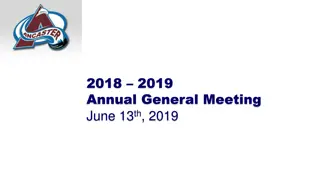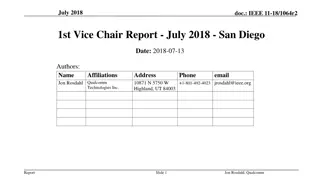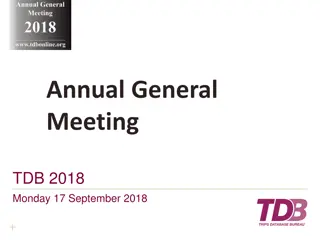
Digital Communication: Adaptive Delta Modulation Lecture 6-2
Explore the concepts of adaptive delta modulation in digital communication as presented in Lecture 6-2 at the University of Mustansiriyah, College of Engineering. Learn about controlling the step size, integrators, gain control, slope overload, demodulators, M-level DPCM systems, and more in this insightful lecture.
Download Presentation

Please find below an Image/Link to download the presentation.
The content on the website is provided AS IS for your information and personal use only. It may not be sold, licensed, or shared on other websites without obtaining consent from the author. If you encounter any issues during the download, it is possible that the publisher has removed the file from their server.
You are allowed to download the files provided on this website for personal or commercial use, subject to the condition that they are used lawfully. All files are the property of their respective owners.
The content on the website is provided AS IS for your information and personal use only. It may not be sold, licensed, or shared on other websites without obtaining consent from the author.
E N D
Presentation Transcript
University of Mustansiriyah College of Engineering Department of Computer Engineering Second Class/ Second Semester Digital Communication Adaptive delta modulation Dr. Haider Tarish Haider Email: haiderth@uomustansiriyah.edu.iq 2019-218 1 Lecture 6-2
2 Lecture 6-2
The step size is varied by controlling the gain of the integrator which is assumed to have a low gain when the control voltage is zero and a larger with increasing gain +ve control voltage the gain control voltage consist an RC integrated & square low device. When the i/p is constant or slowly varying the DM will be hunted and the modulator will be a sequence of alternate polarity pulses these pulses when integrated by the RC filter give an average o/p of all most zero the gain control i/p & hence the gain & the step size are small. 3 Lecture 6-2
In case of slope over load, the o/p of quantizer will be a train of all +ve or all ve pulses. The integrator provides a large control voltage and the gain of amplifier is increase because of the squaring cct the amplifier gain will increase regardless the polarity of the pulses this result will increase in step size and a reduction in slop over load. The demodulator in an adaptive DM system will have an adaptive gain control similar to the one used in the modulator. M- Level DPCM systems: This techniques uses an M- level quantizer to quantize the difference signal. Thus the o/p of the sampler ysq(t) is an impulse train in which the strength of the impulses can have one of the M possible levels. If M=2 then DPCM reduces to DM. 4 Lecture 6-2
5 Lecture 6-2
Q & A Q & A Thank You Thank You 6






















